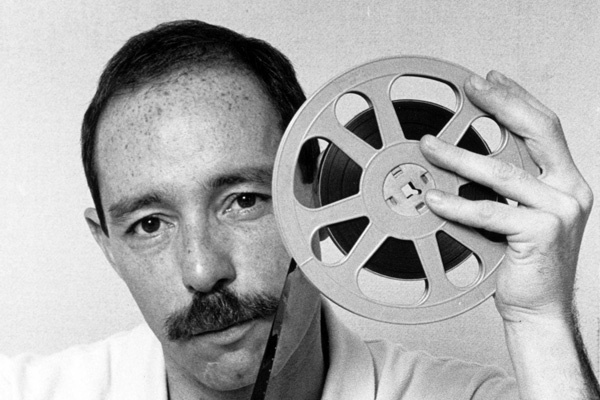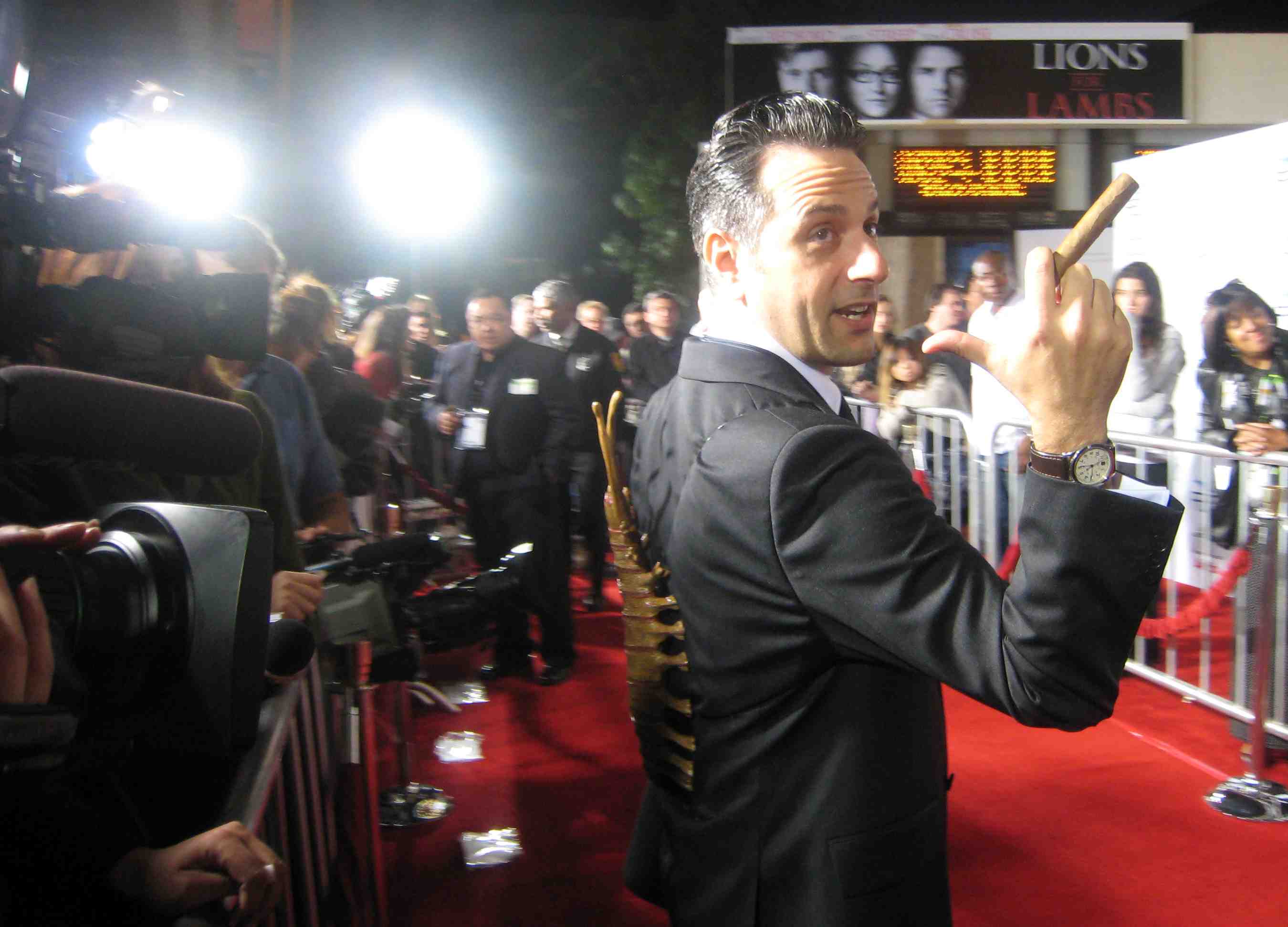If you didn't get a chance to see the premiere of VITO last week, make sure to tune in to one of its final airings [July 31st: 12:45 p.m.; Aug. 4th: 3:00 p.m.; Aug 8th: 9:15 a.m.] or find it on alternate HBO channels or HBOGO. The documentary is about the life and activism of Vito Russo (1946-1990) who was the author of the seminal non-fiction book "The Celluloid Closet" the definitive kick off point to the now robust commonplace conversation about the depiction of LGBT people in filmed entertainment.
 VITO RUSSO (1946-1990), Author, Activist, Cinephile
VITO RUSSO (1946-1990), Author, Activist, Cinephile
I spoke with Jeffrey Schwarz, Vito's director, for Towleroad last weekend. I'd previously seen Schwarz's documentary about B movie showman William Castle (Spine Tingler! The William Castle Story) and we talked for an hour about a wide range of things beyond Vito including his work as the producer of "added value content" for DVDs. He's worked for a who's who of auteurs (Lynch, Scorsese, the Coens, and many many more) on bonus features and "making of" projects. It's not a subject one hears much about in terms of what goes on behind the curtain -- The Making of The Making of! -- perhaps that's diving too deep down the DVD/Bluray rabbit hole?
But I thought I'd share a few notes that didn't make it into my Towleroad interview for lack of space as well as being slightly off the Vito doc topic.
NATHANIEL R: You run this company Automat Pictures that does DVD extras. You've worked with these legends, almost mythically famous directors.
JEFFREY SCHWARZ: If you love movies, what I do for a living is a like a dream come true. I started doing this in 1998 when I got a job editing and shooting behind the scenes on Gus Van Sant's Psycho. That's how I got into this business. I didn't even have a DVD player yet! The format was first emerging and the studios were hiring independent producers to make added value content. I got lucky because I was in the right place at the right time. I'd actually pitched my William Castle movie to Sony because they own all the William Castle movies. I was a little bit naive thinking that this big studio would want to produce my documentary but they did end up hiring me to produce the DVD extras for The Tingler!
That's really what got me started -- first it was Psycho, then it was The Tingler! and that led to other jobs for other studios.
 Jeffrey Schwarz at screening of SPINE TINGLER! (image via Gay of the Dead)
Jeffrey Schwarz at screening of SPINE TINGLER! (image via Gay of the Dead)
more after the jump including oscar protests, evil lesbians, and staying angry
NATHANIEL: Your list of credits is so long.
JEFFREY: It's a cool thing. I've gotten to meet and work with so many of my personal favorite directors. I've been able to profile library titles, looking back on films from a historical perspective, but also work on what they call "day and date" titles. Like right now I'm working on Resident Evil 5. I get to do all kinds of projects.
NATHANIEL: You have two very sensational doc subjects lined up -- Divine than Anita Bryant. Hollywood loves biopics so have you ever wanted to move over to narrative features since you keep telling life stories?
JEFFREY: When the right project comes along, I'd like to do a narrative. I'm developing a horror film called Lizzie.
Lizzie Borden?
Lizzie Borden, yes. It's a modern day retelling. And I'm developing a biopic on George Kuchar and his twin brother Mike Kuchar who were darlings of the underground film scene. We're also developing a feature about Jack Wrangler that's based on the documentary [Wrangler: Anatomy of an Icon].
As a kid were you also obsessed with movies?
Oh certainly. I was one of those monster kids you read about. I was reading Famous Monsters of Filmland and Fangoria magazine. I think I identified with outsider figures and the monsters. In a way that kind of prepped me for outsider status of being a gay person. There are so many gay people that were monster fans growing up and we've all kind of found each other.
I've noticed that. A lot of gay genre fans, particularly horror.
There's even a website called Camp Blood which is a gay and lesbian take on horror films. Vito would talk about gay subtext in horror films, he would talk about how gay people that were presented in the movies of the 30s and 40s and 50s films became more sinister. It was very much like horror films. A film like Dracula's Daughter which is a heavily lesbian oriented film, or with a character who could be interpreted as a lesbian, and she's a vampire. And there's a whole subgenre of lesbian vampire movies.

 Dracula's Daughter and Rebecca = Spooky lesbians!
Dracula's Daughter and Rebecca = Spooky lesbians!
Do you ever worry about losing all these great characters? I think of Mrs. Danvers in Rebecca. They say great art comes in times of oppression. If there's nothing to struggle against won't we lose the fascinating subversive characters?
That's a really good question but I think kids are still being taught to hate themselves so there's still plenty to be angry about. I think our focus has really been on these large institutional goals like marriage and the military but look what just happened with the Boy Scouts.
And Chic-fil-A
And Chic-fil-A. There's a guy running for president who wants a constitutional amendment to ban gay marriage. And it's not that he even really believes that. I mean, I don't think half the people who spout this bullshit even believe what they're saying.
Neither do I.
They're just pandering to the lowest common denominator, right? We're still being used as scapegoats and political football. It's bullshit and it's time that we call bullshit on it. Vito would say things like 'we'll get our movies when we make then. We'll get our rights when we take them.' I love that quote. Of course he was a movie queen so he tied his love of the movies in with his activism. He found a way to connect all the dots for us.
I just watched Pink Narcissus recently. I was thinking that James Bidgood or the struggle over that film would make for an interesting documentary.
Do you know that film Keep the Lights On? There's a film within the film, the character is making a documentary about one of his contemporaries, Avery Willard.
Oh right, Yeah, I've seen it.
All those clips. Someone just made a documentary about Avery Willard and James Bidgood is in that. But you know there's still plenty of cool stuff going on. I love what Peaches Christ is doing up in San Francisco with her midnight movies. There are still people carrying the torch of queer art films here in New York. Adam Baran and Ira Sachs are doing these revival screenings and trying to turn new audiences on to these queer classics, things that are in the canon that we assume every knows. You can't assume that. You have to constantly be turning people on to these things.
 Lily Tomlin and Jeffrey Schwarz about to film an interview for "Vito". Lily Tomlin was Vito's close personal friend for decades
Lily Tomlin and Jeffrey Schwarz about to film an interview for "Vito". Lily Tomlin was Vito's close personal friend for decades
That's what Vito did at his Firehouse screenings in the early 70s. He realized that the way we perceive movies collectively is different than how we perceive them individually. He used movies to create community and that's what gay film festivals do today.
What do you think Vito would have made of today's LGBT cinema?
I don't want to speak for Vito but there have been some great movies like Brokeback Mountain, like Milk, like Beginners but guess what happens: the gay character dies. But then there's, like, The Kids Are All Right which is a lovely movie and my guess is he would have really championed that film. He championed indie films like Parting Glances and Desert Hearts -- those are films he really loved. He died right before the new Queer Cinema hit.
So no Todd Haynes, which is sad.
He didn't get to see Poison. A lot of those filmmakers who are from the New Queer Cinema group, they cite Vito as an influence. The protests against Basic Instinct and against The Silence of the Lambs and JFK at the Oscars for 1991. I mean, Vito had just died but it's like they used "The Celluloid Closet" as a guidebook.
It was a hot topic.
It was and Vito wanted us to speak directly to Hollywood.
 Miriam Cutler, Philip Harrison, Jeffrey Schwarz and Joe Milner working on "Vito"
Miriam Cutler, Philip Harrison, Jeffrey Schwarz and Joe Milner working on "Vito"